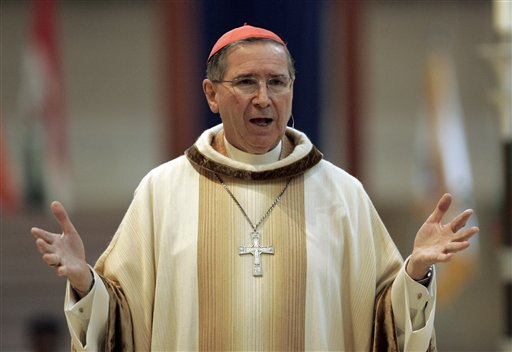LA archbishop relieves retired cardinal of duties

In this Sept. 22, 2007 file photo, Cardinal Roger Mahony speaks during an annual multi-ethnic migration Mass at the Cathedral of Our Lady of the Angels in Los Angeles. Los Angeles Archbishop Jose Gomez has relieved retired Cardinal Roger Mahony of his remaining duties, on the same night the church released thousands more files on priest sexual abuse. Gomez released a statement Thursday Jan. 31, 2013, saying he has told Mahony he will no longer have any administrative or public duties. (AP Photo/Reed Saxon, File)
LOS ANGELES—Retired Cardinal Roger Mahony, the former head of the nation’s largest Roman Catholic diocese, was stripped of his duties by his successor as the Los Angeles archdiocese released thousands of pages of personnel files of priests accused of child molestation.
Archbishop Jose Gomez announced that he informed Cardinal Mahony that he will no longer have any administrative or public duties.
“I find these files to be brutal and painful reading,” Archbishop Gomez said in a statement, referring to the newly released files made public by the church Thursday night just hours after a judge’s order. “The behavior described in these files is terribly sad and evil. There is no excuse, no explaining away what happened to these children.”
The archbishop also said Monsignor Thomas Curry, former vicar of the clergy who was Mahony’s point person for dealing with priests accused of molestation, has stepped down from his post as head of the diocese’s Santa Barbara region.
The public denouncement of Mahony and Curry was highly unusual and marks a shift from the days when members of the church hierarchy emerged largely unscathed for the roles they played in covering up clergy sex abuse, said the Rev. Thomas Reese, a Jesuit and senior fellow at the Woodstock Theological Center at Georgetown University.
Article continues after this advertisement“It’s quite extraordinary. I don’t think anything like this has happened before,” Reese said. “It’s showing that there are consequences now to mismanaging the sex abuse crisis.”
Article continues after this advertisementOthers, however, said Gomez’s actions, particularly against Mahony, carried little weight as long as he remained a cardinal and a member of the Vatican body that elects the Pope.
The reprimand is a “purely symbolic punishment that they hope will satisfy at least some people in the archdiocese,” said Terry McKiernan, founder of BishopAccountability.org, which tracks the release of priest files nationally.
“I don’t think that many savvy observers of this will be deceived.”
Mahony, who retired in 2011 after more than a quarter-century at the helm of the archdiocese, has publicly apologized for mistakes he made in dealing with priests who molested children.
Earlier Thursday, Los Angeles Superior Court Judge Emilie Elias ordered the diocese to turn over thousands of pages from the confidential files of priests accused of child molestation without blacking out the names of top church officials who were responsible for handling priests accused of abuse.
The judge gave the archdiocese until Feb. 22 to turn over the files to attorneys for the alleged victims, but they were released almost immediately.
The church said in a statement that the files’ release “concludes a sad and shameful chapter in the history of our local church.”
The archdiocese, the nation’s largest, had planned to black out the names of members of the church hierarchy who were responsible for the priests, and instead provide a cover sheet for each priest’s file, listing the names of top officials who handled that case. The church reversed course Wednesday after The Associated Press, the Los Angeles Times and plaintiff attorneys objected in court.
A record-breaking $660 million settlement in 2007 with more than 500 alleged victims paved the way for the ultimate disclosure of the tens of thousands of pages, but the archdiocese and individual priests fought to keep them secret for more than five years.
A first round of 14 priest files made public in Los Angeles nearly two weeks ago showed that Mahony and other top officials maneuvered behind the scenes to shield molester priests, provide damage control for the church and keep parishioners in the dark about sexual abuse in their parishes. Those documents, released as part of an unrelated civil lawsuit, were not redacted and provided a glimpse of what could be contained in the larger release.
The files, some of them dating back decades, contain letters among top church officials, accused priests and archdiocese attorneys, complaints from parents, medical and psychological records and — in some cases — correspondence with the Vatican.
Similar document releases in other dioceses, including Boston, have shown top church officials shuffled molesting priests from parish to parish, failed to call police and kept parishioners in the dark.